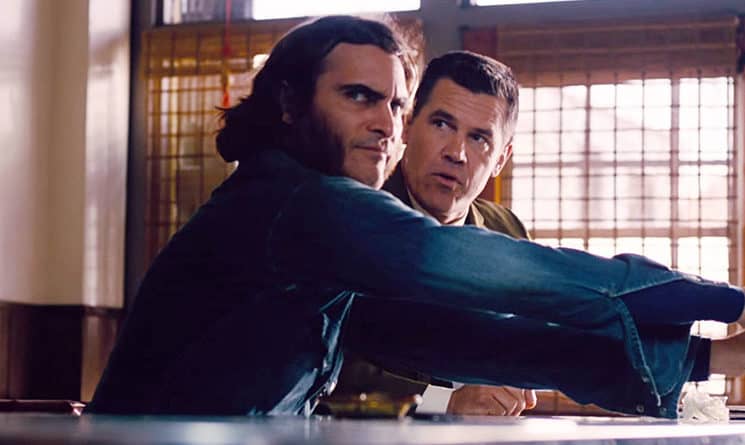As “Inherent Vice,” the latest film from Paul Thomas Anderson, opens, it’s 1970 in California. The Summer of Love is long over and everyone’s paranoid. The hippies and various radical movements think they’re being infiltrated by the feds, and the feds, cops, and regular law-abiding folk think every long-haired stoner is a member of some Manson-esque cult. And, of course, the dopers and beach bums are paranoid because of all the drugs.
Private eye Doc Sportello (Joaquin Phoenix), the movie’s protagonist, belongs somewhere in all three categories. He’s a licensed PI with an office and a girlfriend down at the D.A.’s office; he also likes to keep his mind limber thanks to a serious drug regimen. And boy does he need as limber a mind as possible. Doc’s ex-girlfriend, Shasta (Katherine Waterston), shows up asking for help. Her boyfriend, a real estate mogul named Mickey Wolfmann (Eric Roberts) is the target of a kidnapping plot, likely cobbled together by his wife and her boyfriend. Shasta needs help, and Doc’s the only person she can trust.
Shasta’s assignment kicks off the action in “Inherent Vice,” but the case is ultimately less important than the world that Doc inhabits. Cultural transitions are one of the themes that Anderson returns to in his work (the post-World War II years in “The Master,” the end of the “golden age of porn” in “Boogie Nights), and in “Inherent Vice,” Anderson uses Doc to guide us through those strange days following Altamont and the killings by the Manson Family. All the promises of revolution and social change are long gone and the only members of the counter-culture left standing have either sold out or sold their souls — taken over by “the ancient forces of greed and fear,” as the film’s narrator says at one point. Everyone else is damaged goods, and Doc, seemingly the only honest guy left, has to pick up the pieces.
Because this is an Anderson film, one based on a Thomas Pynchon novel, there are lots of pieces, plot threads, and characters to sort out. It’s not long before Doc’s search for Mickey branches off into a number of baffling directions, from low-level conspiracies between white supremacist biker gangs and black power radicals to a sinister syndicate called The Golden Fang, which is either an international heroin ring or a consortium of dentists — or maybe both. Along the way, Doc is tasked with finding Coy Harlingen (Owen Wilson), the sax player in a surf rock band who’s supposed to be dead, but is actually working as an undercover government informant.
The movie becomes a dream-like voyage steeped in an atmosphere of goofy paranoia
and melancholic longing.
“Inherent Vice” is as twisty and complicated as noirs come, but like most crime films, the plot’s beside the point. Anderson never tries to make sense of the various threads; instead, the movie becomes a dream-like voyage steeped in an atmosphere of goofy paranoia and melancholic longing. Shot on 35mm film with cinematography by Robert Elswit, the movie looks like a faded piece of Pop Art, a memory of a time that seemed bright but, in retrospect, took on darker hues.
Even with that melancholy atmosphere, “Inherent Vice” is hilarious, and may be Anderson’s funniest film. Pynchon’s novels are dense with jokes, and Anderson found a way to bring that to the screen, with visual gags, sharp dialogue, and great moments of comic acting from Phoenix and others. Anderson uses close-ups throughout “Inherent Vice,” challenging viewers to look closely at each character to see if they are actually who they say they are — or if they’re really there at all and aren’t a figment of Doc’s imagination. In one of the film’s funniest scenes, Doc watches in horror and fascination as his longtime-nemesis/occasional ally Det. “Bigfoot” Bjornsen (Josh Brolin) eats a chocolate-covered banana; it should be a throwaway moment, but Phoenix’s expressions elevate it to a hilarious setpiece.
It helps, too, that the whole cast is great. Brolin gives what could’ve been a stock character a lot of layers (in one scene, he gleefully stomps on Doc; later, he phones Doc in a fit of sadness to complain about his floundering acting career). Hong Chau and Martin Short have two small, but astonishingly funny, performances — Chau as a massage parlor receptionist who becomes Doc’s friend, and Short as a sinister, drug-addled dentist. There’s also Joanna Newsom as Sortilège, who may or may not be a figment of Doc’s imagination, but otherwise acts the narrator, mischievously doling out plot points, social commentary, and astrological tidbits. Wilson, like Phoenix, balances the comedic and the dramatic. They’re both goofy stoners, but there’s a sense that underneath their dopey exteriors, they’re trying to make something right. And though she gets relatively little screen time, Waterston is great as Shasta. In just a few scenes, she embodies the movie’s melancholy heart.
“Inherent Vice” carries traces of other California noirs in its cinematic DNA — “The Big Lebowski,” Robert Altman’s “The Long Goodbye,” and “Chinatown” are all forbearers. But its closest cousin might be “Easy Rider,” the saga of Dennis Hopper and Peter Fonda’s doomed search for America. “We blew it,” Fonda’s character says in the film, referring to all the hopes and promises of the counter-culture. Anderson and Pynchon mostly agree — greed and fear tear down everything that’s good. But as long as there are folks like Doc around, there’s another chance to get
it right.

